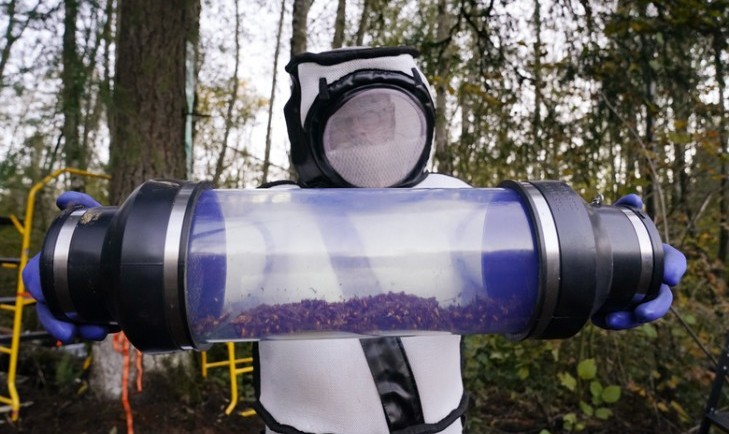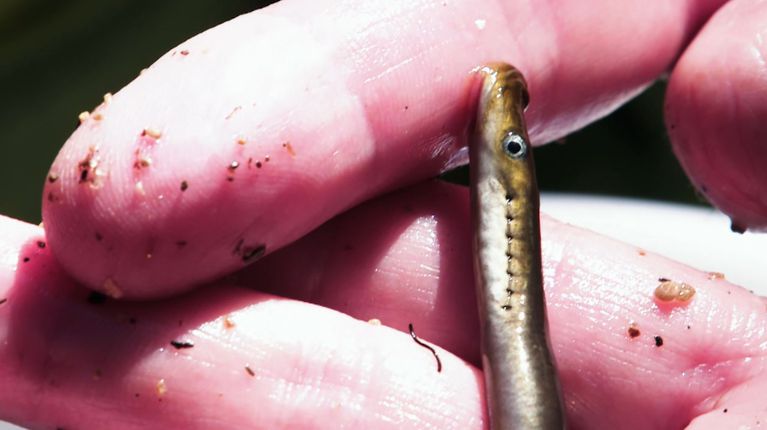
The Western Governors' Association keeps you updated on the latest news in the West. Here are the top stories for the week starting Oct. 26, 2020. Photo courtesy of The Seattle Times.
Workers from the Washington State Department of Agriculture recently destroyed the first nest of Asian giant hornets – colloquially known as “murder hornets” – discovered within the United States.
According to The Seattle Times, the nest was located in Whatcom County near the Canadian border. Scientists were able to recover 98 hornets, including 13 that were captured alive, without sustaining any stings or other injuries.
Asian giant hornets are an invasive species known for their painful, potentially deadly sting, as well as the threat they pose to local honeybee populations. In some cases, swarms of Asian giant hornets have been known to wipe out entire honeybee hives in a matter of hours.
“This is only the start of our work to hopefully prevent the Asian giant hornet from gaining a foothold in the Pacific Northwest,” said Sven-Erik Spichiger, the entomologist who directed the nest eradication. “It still looks optimistic that we are ahead of this.”
In July, Spichiger spoke with WGA Senior Policy Advisor Bill Whitacre for an episode of our podcast, Out West, “The Buzz About Murder Hornets – Separating Fact from Fiction.” Listen on Podbean, Spotify, or Apple Podcasts.
Wildfires: With nearly its entire faculty and student body forced to evacuate due to the East Troublesome Fire, the East Grand School District in Granby, Colorado is struggling to salvage the remainder of its academic year. According to The Colorado Sun, the majority of the district’s some 1,300 students have been learning in-person since late August, but in the wake of the devastating blaze – now the second largest in state history – it is unclear how and when classes will resume. “There’s so many issues that go along with COVID, and then we throw kids who are evacuated or homeless into the mix, it’s going to be a challenge to reopen very soon, I think,” said Superintendent Frank Reeves. “We may be able to pivot to a distance learning plan.” More. Click here for the latest wildfire updates.
Outdoor Recreation: As colder weather descends on much of the West, residents are looking for new ways to stay busy in the era of social distancing. But, Boise State Public Radio reports, supplies for many winter activities may be limited this year, owing to supply chain interruptions caused by COVID-19. “Everything from snowshoes to cross country to downhill equipment to backcountry equipment — if people are looking forward to winter, they're looking forward to having something to do outside," said Jeff Lewerenz, co-owner of Idaho’s Greenwoods Ski Haus. “If you're looking to do it, do it sooner than later." In addition to higher sales volumes, businesses with online classes have seen a major uptick in interest as well. More.
Rural Hospitals: Critical access hospitals in rural Montana are struggling to keep up with an influx of COVID-19 patients, as cases continue to surge across the nation. In many instances, these healthcare facilities have limited staff and less than a few dozen beds, according to Montana Public Radio, meaning it doesn’t take much for them to become overwhelmed. "If this pattern continues, we are going to exhaust our capability of caring for the community and have to divert patients to other communities,” said Randy Holom, CEO of Frances Mahon Deaconess Hospital. “[And] there’s no beds in other communities either." In response to this crisis, Gov. Steve Bullock has requested medical staffing from other states and the National Guard, but assistance has yet to arrive. More.
 Lampreys Return: For decades, the Miller Lake lamprey, a worm-like parasite, was thought to have been extinct in Oregon since a coordinated removal effort in the 1950s. “When I went to Oregon State University, it was taught to me that this was not a good effort,” said Roger Smith, a retired fish biologist who spent years in charge of the Miller Lake watershed. “This was an effort that destroyed a unique species and brought it into extinction.” Now, after several years of transporting lampreys to streams that feed the lake, scientists have found new juveniles, suggesting that the organism might be making an unlikely comeback in its native home. “Is this evidence of recolonization of the lake?” asked Ben Clemens, the lamprey coordinator for the Oregon Department of Fish and Wildlife. “I would say we don’t have quite enough information to conclude definitively yet, but it’s exciting.” More.
Lampreys Return: For decades, the Miller Lake lamprey, a worm-like parasite, was thought to have been extinct in Oregon since a coordinated removal effort in the 1950s. “When I went to Oregon State University, it was taught to me that this was not a good effort,” said Roger Smith, a retired fish biologist who spent years in charge of the Miller Lake watershed. “This was an effort that destroyed a unique species and brought it into extinction.” Now, after several years of transporting lampreys to streams that feed the lake, scientists have found new juveniles, suggesting that the organism might be making an unlikely comeback in its native home. “Is this evidence of recolonization of the lake?” asked Ben Clemens, the lamprey coordinator for the Oregon Department of Fish and Wildlife. “I would say we don’t have quite enough information to conclude definitively yet, but it’s exciting.” More.
ICYMI: COVID-19 in the West: A state-by-state breakdown of the Governors’ work (updated regularly)
Get the latest news about the West and its governors by following the Western Governors' Association on Twitter, Facebook and LinkedIn.
Check out our podcast, Out West, on Podbean, Spotify and Apple Podcasts